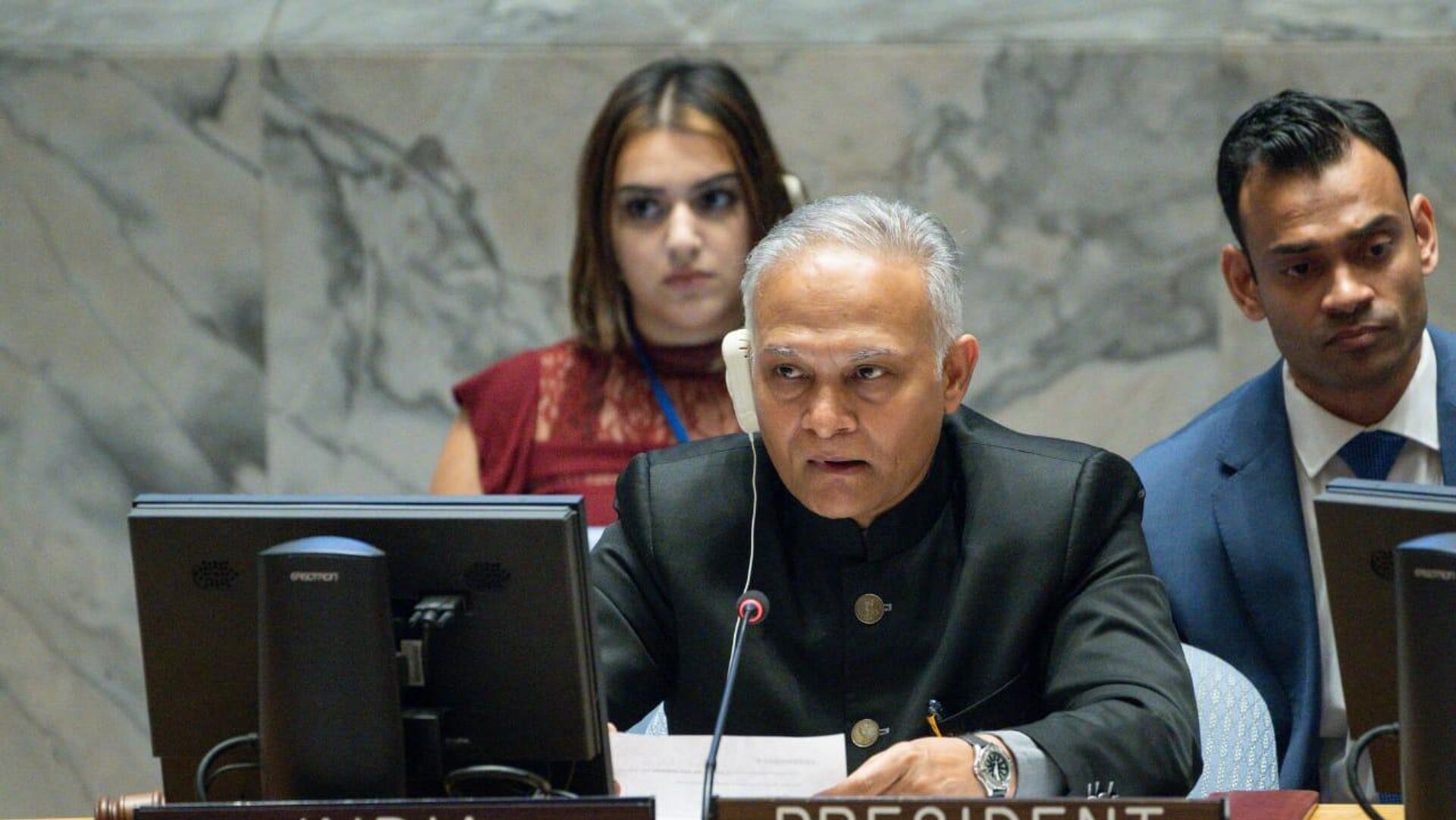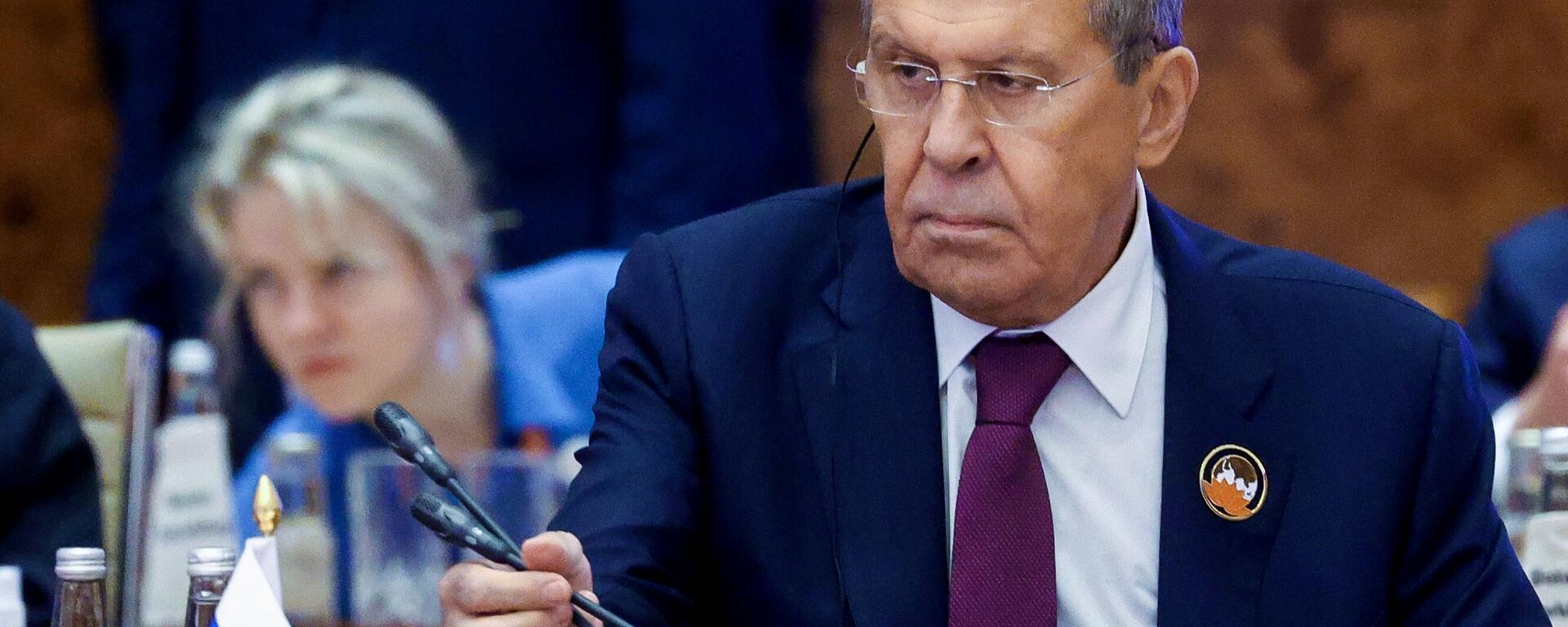https://sputniknews.in/20230922/india-calls-for-keeping-all-diplomacy-channels-open-to-end-ukraine-conflict-4380875.html
India Calls for Keeping All Diplomacy Channels Open to End Ukraine Conflict
India Calls for Keeping All Diplomacy Channels Open to End Ukraine Conflict
Sputnik India
India has told the United Nations (UN) Security Council that “all channels of diplomacy must be kept open” in order to resolve the Ukraine conflict.
2023-09-22T13:52+0530
2023-09-22T13:52+0530
2023-09-22T13:52+0530
ukraine conflict
vladimir putin
ukraine
india
russia
un security council (unsc)
the united nations (un)
food
food security
food insecurity
https://cdn1.img.sputniknews.in/img/07e6/0c/15/177196_0:0:1280:721_1920x0_80_0_0_8aef49c5abec9ea730466601e88432de.jpg
Russian President Vladimir Putin has said Kiev to repeal the ban on negotiations with Russia if it was serious about ending the conflict. The ban on talks with Russia was introduced by Ukrainian leader Volodymyr Zelensky last year.India has told the United Nations (UN) Security Council that all channels of diplomacy must be kept open in order to resolve the Ukraine conflict.Verma, who is also a Secretary, at the MEA, highlighted that New Delhi continues to be concerned about the situation in Ukraine.He called upon all the countries to uphold the principles of the UN Charter, underlining that the global order was underpinned by respect for international law.The Indian diplomat raised questions on the failure of the UN Security Council to resolve the conflict in Ukraine, reiterating New Delhi’s position on the need to “reform and reinvent” multilateral institutions by increasing representation of developing countries.Collateral Consequences Being Borne by Global South: IndiaVerma expressed concerns over the “collateral consequences” of the Ukraine crisis on the developing nations, particularly in terms of spiralling food, fuel and fertilizer prices.He noted that the spillovers of Ukraine conflict have been to the detriment of developing nations more than others.The ongoing efforts by G7 allies to phase out Russian commodities from global supply chains has been viewed as the primary cause of the escalating prices in developing states. Moscow has been a big exporter of food grains, fertilizers and energy resources.He noted that India’s G20 presidency, which would conclude in November, has striven to bring to the fore the issues of Global South to the global agenda.
https://sputniknews.in/20230910/global-south-stopped-west-from-making-ukraine-key-topic-at-g-20-lavrov-4168672.html
ukraine
india
russia
black sea
global south
africa
Sputnik India
feedback.hindi@sputniknews.com
+74956456601
MIA „Rossiya Segodnya“
2023
Dhairya Maheshwari
https://cdn1.img.sputniknews.in/img/07e6/0c/13/138962_0:0:641:640_100x100_80_0_0_2cb44360dbcdf6d84bf4b299cd045917.jpg
Dhairya Maheshwari
https://cdn1.img.sputniknews.in/img/07e6/0c/13/138962_0:0:641:640_100x100_80_0_0_2cb44360dbcdf6d84bf4b299cd045917.jpg
News
en_IN
Sputnik India
feedback.hindi@sputniknews.com
+74956456601
MIA „Rossiya Segodnya“
Sputnik India
feedback.hindi@sputniknews.com
+74956456601
MIA „Rossiya Segodnya“
Dhairya Maheshwari
https://cdn1.img.sputniknews.in/img/07e6/0c/13/138962_0:0:641:640_100x100_80_0_0_2cb44360dbcdf6d84bf4b299cd045917.jpg
russia ukraine news, russia news, russia india relations, ukraine news, ukraine russia war, ukraine russia news, ukraine russia, ukraine russia update, food crisis, fertilizer crisis, g7 sanctions against moscow, g7 sanctions, g20 joint statement, g20 summit
russia ukraine news, russia news, russia india relations, ukraine news, ukraine russia war, ukraine russia news, ukraine russia, ukraine russia update, food crisis, fertilizer crisis, g7 sanctions against moscow, g7 sanctions, g20 joint statement, g20 summit
India Calls for Keeping All Diplomacy Channels Open to End Ukraine Conflict
Russia has called on Ukraine to hold negotiations to end the conflict. Other nations have also called for negotiations, but the Kiev regime has rejected talks. It has also imposed a ban on negotiations with Russia, demonstrating a lack of intention to end the conflict.
Russian President Vladimir Putin has said Kiev to repeal the ban on negotiations with Russia if it was serious about ending the conflict. The ban on talks with Russia was introduced by Ukrainian leader Volodymyr Zelensky last year.
India has told the United Nations (UN) Security Council that all channels of diplomacy must be kept open in order to resolve the Ukraine conflict.
Dialogue is the only answer to settling differences and disputes, however daunting that may appear at this moment. The path to peace requires us to keep all channels of diplomacy open,” India’s Vice External Affairs Minister Sanjay Verma told an UNSC open debate on Ukraine at the United Nations headquarters.
Verma, who is also a Secretary, at the MEA, highlighted that New Delhi
continues to be concerned about the situation in Ukraine.
“Escalation of hostilities and violence is in no one’s interest. We have urged that all efforts be made for an immediate cessation of hostilities and an urgent return to the path of dialogue and diplomacy,” Verma stressed.
He called upon all the countries to uphold the principles of the UN Charter, underlining that the global order was underpinned by respect for international law.
The Indian diplomat raised questions on the failure of the UN Security Council to resolve the conflict in Ukraine, reiterating New Delhi’s position on the need to
“reform and reinvent” multilateral institutions by increasing representation of developing countries.
“And unless we fix that systemic flaw, we will continue to be found wanting,” he cautioned.
Collateral Consequences Being Borne by Global South: India
Verma expressed concerns over the “collateral consequences” of the Ukraine crisis on the developing nations, particularly in terms of spiralling food, fuel and fertilizer prices.
He noted that the spillovers of Ukraine conflict have been to the detriment of developing nations more than others.
The ongoing efforts by G7 allies to phase out Russian commodities from global supply chains has been viewed as the primary cause of the escalating prices in developing states. Moscow has been a big exporter of food grains, fertilizers and energy resources.
“From our perspective, it is critical that their voices are heard and their legitimate concerns duly addressed,” Verma said.
He noted that India’s G20 presidency, which would conclude in November, has striven to bring to the fore the issues of Global South to the global agenda.



